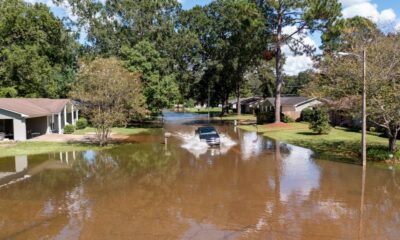

News
Extreme weather and flooding dampen National Rail profits
Network Rail has reported a pre-tax profit of £1 billion for the year ending March 31, but says that severe winter weather, which caused flooding in many parts of the country as well as destroying a railway line, caused major impacts on delays and profits.
Britain’s largest railway infrastructure group has enjoyed a “renaissance” of train travel as record high numbers of travellers are choosing the railways over alternatives – with a rise of 5.7% over the course of the year, adding up to a total of 1.5 billion passengers.
This means that the number of people using the railways has doubled since the mass privatisation of the rail network two decades ago.
But the percentage of trains that ran on time fell to 90% from 90.9% last year, below Network Rail’s target of 92.5%.
The company is keen to stress that poor weather played a part. The UK’s wettest winter in 250 years caused havoc earlier this year, with thousands of homes affected by electricity black-outs, as severe flooding and gale force winds caused travel disruption across the country. Such extreme weather is only likely to become more frequent as global warming continues, recent studies have warned.
Talking to BBC Radio 4, Mark Carne, Network Rail chief executive said, “We are in the middle of a rail renaissance, with record levels of passenger numbers and record levels of investment. This flourishing sector is investing heavily to improve the railway for today and for tomorrow.
He added, “We did not hit our regulatory targets […] and I think we know we have to do better and we are very determined to address those issues so that we can provide the high quality of service that passengers expect.”
Network Rail is keen to promote its dedication to reforming the nature of British railways, as it announced in May that bonuses for its directors would be cut from 160% to just 20%, with no move to increase their overall wage to compensate.
However, regardless of the higher number of delays, constant increases in rail fares have created consumer animosity – as prices haven risen by an average of 2.8% this year.
Further Reading:
Infographic: the UK’s wettest winter in 250 years
Poll: 47% of Britons say floods are a result of climate change
A fire sale of East Coast rail operator is uneconomic and undemocratic


 Environment12 months ago
Environment12 months agoAre Polymer Banknotes: an Eco-Friendly Trend or a Groundswell?

 Features11 months ago
Features11 months agoEco-Friendly Cryptocurrencies: Sustainable Investment Choices

 Features12 months ago
Features12 months agoEco-Friendly Crypto Traders Must Find the Right Exchange

 Energy11 months ago
Energy11 months agoThe Growing Role of Solar Panels in Ireland’s Energy Future





























